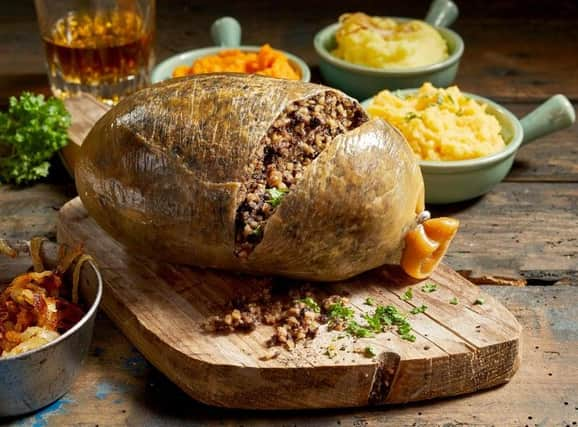Hopes are high for lab grown haggis - to be ready for Burns Night in 2023


Roslin Technologies, an innovative agritech company based in the Midlothian Science Zone, is supplying companies across three continents with all the components and instructions to grow animal protein in a tank.
The firm is a spin-off from the University of Edinburgh with links to the Roslin Institute, which reared Dolly the Sheep - the world's first cloned mammal.
Advertisement
Hide AdAdvertisement
Hide AdIt supplies stem cells, collected from live animals, and instructions for growing them inside a bioreactor to cultivated meat start-up companies across the world, which can grow them in Olympic-sized swimming pools within 63 days of receiving a package.
The world's first lab-grown beefburger was served up in 2013, and a team of 24 experts from eight countries now hope to branch out to a lab grown Burns Night supper, as well as sushi, and more conventional meat products like sausages using a 3D printer.
Ernst Van Orsouw, who took over as chief executive last summer, believes artificially created meat offers a more sustainable alternative to traditionally reared equivalents but will never completely replace agriculture.
The first lab grown beefburger took scientists in the Netherlands two years to create and came with a $300,000 price tag.
Advertisement
Hide AdAdvertisement
Hide AdIndustrial meat production is the single biggest cause of deforestation worldwide, with vast swaths of woodlands being cut down to make way for pastures or crops used as feed and causes excess methane gas in the ozone layer, contributing to global warming.
Cultivated meat scores much higher, with no need for massive tracts of land or medicines - it can be grown in urban centres, near consumers and is produced in a sterile environment, inside a bioreactor.
Deals have already been signed with companies in the US and Europe and talks are underway for expansion into Asia and Latin America, amid hopes mass consumption could be achieved in five years with £11million funding in place.
Mr Van Orsouw said: "I don't see a world where animal agriculture doesn't exist.
Advertisement
Hide AdAdvertisement
Hide Ad"There will always be a big proportion of meat in the market.
"But I think there is likely to be a variety of many proteins in the mix, including livestock-based, plant-based and lab-based.".
Products will need to be thoroughly vetted and approved by food standard authorities before they can be widely sold - only in Singapore has this already happened..
Mr Van Orsouw said."The outlook is really exciting.
"The industry may be decades away from realising its full potential, but the foundations are already being built here in Scotland today.
Advertisement
Hide AdAdvertisement
Hide Ad"Roslin Technologies makes pluripotent stem cells that can differentiate into any tissue.
"We ship them in vials to places all over the world.
"We provide starter cells, a recipe for the growing medium and cooking instructions, then the companies can make their own protein.
"We also provide an ongoing arrangement where we will continue to supply new cells to reflect any improvements or innovations.
"My personal thoughts are that we will see a completely new look for these products.
"It would be very cool for a Scottish firm to make the first lab-grown haggis."